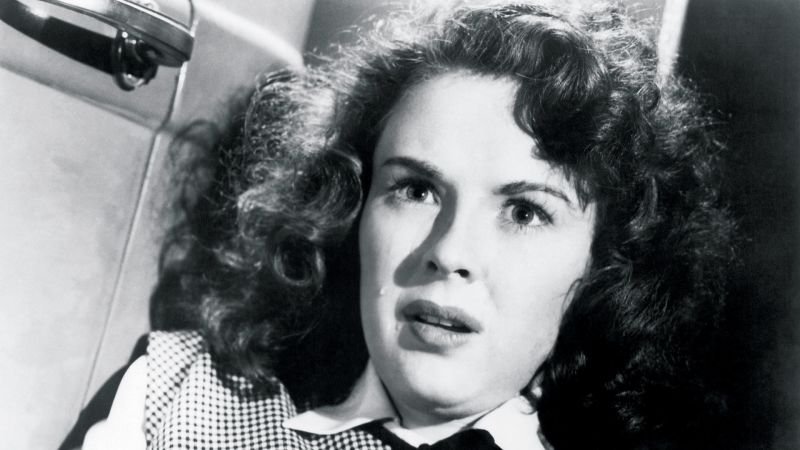Outrage | Blu-ray Review
Mala Powers in Outrage
Anatomy of Assault: Lupino Explores Victimization in Controversial Melodrama
By Nicholas Bell | Published on October 20, 2023
While things have certainly progressed in the seventy plus years since something like Outrage (1950) was released, which was instantly notable for even addressing the reality of rape, certain elements of Ida Lupino’s sophomore directorial effort remain intact, namely the ripple effects of trauma the criminal justice system remains ignorant on addressing. In short, it’s a rather overstated film about how hurt people hurt people, but its mere existence justifies its legacy, one of a handful of Lupino’s trailblazing achievements as an artist. In the context of the studio era at the onset of the 1950s, it's something of a marvel in retrospect. During the silent era and prior to the advent of the restrictive Hays Code, a dozen or so notable women directed films, though in the US, only Dorothy Arzner managed to carve a career for herself in the 1930s. Lupino had a vibrant acting career in the 1930s and 1940s, eventually compromised by her critique of Jack Warner, who would place her on suspension at Warner Bros., leading Lupino to pursue her interests in directing, creating her own production company, The Filmakers Inc. with then husband Collier Young (who co-wrote and produced this feature). Due to the death of Elmer Clifton on Not Wanted (1949) and the illness of Nicholas Ray on On Dangerous Ground (1951), Lupino was allowed the chance to direct these projects to completion (though she’s uncredited on the latter), and in 1950, she’d release her first two directorial efforts, the polio drama Never Fear (which Lupino had also suffered from) and this film, which would be the debut of character actress Mala Powers. Though the mechanics of its narrative are rudimentary, it’s a film which manages to effectively convey its intentions despite the Production Code demanding removal of any direct reference to either rape or rapists.
Recently engaged, the happy-go-lucky bookkeeper Ann Walton (Powers) has everything she thinks she needs. But on the way home from work one evening, she’s pursued by a stalker and raped, unable to recall pertinent details about her assailant other than he had a scar on his neck. Attempting, in vain, to shut herself away from the world, where friends, neighbors, and co-workers are all aware of what happened, Ann decides to run away, making her way to Los Angeles. Injuring her ankle, she’s assisted by the kindly Bruce Ferguson (Tod Andrews). He brings her to the home of friends who own an orange farm and Ann lies about her last name as she begins to work for the couple, eventually becoming their bookkeeper. She learns Bruce is a Reverend and the two of them eventually become close. When he coaxes her to attend a local event, Ann is approached by a friendly but overly amorous young man, and his advances remind her of her attacker. She bludgeons him with a wrench, and following her arrest, her true identity is revealed while Bruce does his best to assist Ann as she herself is charged with assault.
As a reference point for how far ahead of its time Outrage is, it would be over a decade later when Carroll Baker and her husband Jack Garfein would tackle something similar in the independent production of Something Wild (1961) in which she starred and he directed. Garfein’s film is more solemn and subdued, with Baker allowed to navigate an internalized performance. Powers is shackled to something more melodramatic, as her compartmentalizing of the rape causes her to become a victimizer herself when she assaults an ‘innocent’ young man who gets a bit too close (never mind the invading of her space, which triggers her knee jerk reaction to maim).
The first half of Outrage is most effective, with Ann having to navigate the invasion of her privacy in a close knit community who know all about her assault plus the frustrated policemen who are trying, in their way, to find the culprit but can’t understand her unwillingness or inability to provide them with any helpful details. The narrative comes close to the identity crisis of a film noir when Ann runs away from her family and a sympathetic but detached fiancé (a dry but serviceable Robert Clarke). The only real relationship transpiring is through the somewhat uncomfortable intervention of Rev. Bruce Ferguson (Tod Andrews, also receiving introductory screen credit even though he’d appeared in several prior films). Lupino toys with the suggestion Ann might love the Reverend, though this seems to be both a displacement and projection of the emotions she hasn’t processed.
Although not as well remembered as Lupino’s other directorial credits, such as 1953’s The Hitch-Hiker (credited as the only ‘true’ noir credited to a woman director), The Bigamist (1953) or her Catholic girls’ school classic The Trouble with Angels (1966), Outrage is notably an early cinematic exploration of sexual assault and violence against women as an ignored, normalized cultural reality through the perspective of a woman whose life is irreparably interrupted.
Disc Review:
Kino Lorber presents Outrage as a new 4K scan from the 35mm print in 1.37:1. Louis Clyde Stoumen and Archie Stout are credited cinematographers, the former a two-time Academy Award Winner for his work in documentary filmmaking, the latter a favorite DP for John Ford. Outrage is a rather standard visual affair, the most stylized sequence occurring when Powers is pursued on the eerily empty evening streets in a world which seems to have offered her up as an unavoidable sacrifice to the night. As an extra feature, Film Historian Imogen Sara Smith provides an audio commentary track.
★★★☆☆ (Movie)
★★★☆☆ (Disc)

